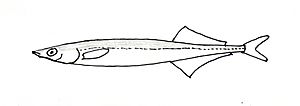Hypoptychus dybowskii facts for kids
Quick facts for kids Hypoptychus dybowskii |
|
|---|---|
 |
|
| Scientific classification | |
| Kingdom: | |
| Phylum: | |
| Class: | |
| Order: | |
| Family: |
Hypoptychidae
|
| Genus: |
Hypoptychus
Steindachner, 1880
|
| Species: |
H. dybowskii
|
| Binomial name | |
| Hypoptychus dybowskii Steindachner, 1880
|
|
The Korean sandlance, also known by its scientific name Hypoptychus dybowskii, is a small type of fish. It lives in shallow salt water near the coasts of Japan and Sakhalin in Russia. You might also find it in South Korea and China. This fish is the only known species in its group, called a genus.
About the Korean Sandlance
The Korean sandlance is a small fish. It can grow up to about 10 cm (around 4 inches) long. This measurement is its total length, from its nose to the tip of its tail.
In some areas, people catch the Korean sandlance. It is an important fish for local fishing. This means it is caught and sold for food or other uses.
What the Sandlance Eats
The Korean sandlance is a predator, but it eats very small things. Its diet is similar to that of stickleback fish. It mostly eats tiny invertebrates, which are animals without backbones. It also feeds on the very young stages of other fish, called fish larvae.
How the Sandlance Reproduces
When it's time to breed, the Korean sandlance has a special way of protecting its eggs. Like sticklebacks, it produces a sticky liquid from its kidneys. The parent fish uses this sticky substance to attach its eggs to sargassum. Sargassum is a type of seaweed that floats in the ocean. This helps keep the eggs safe until they hatch.
 | Janet Taylor Pickett |
 | Synthia Saint James |
 | Howardena Pindell |
 | Faith Ringgold |

